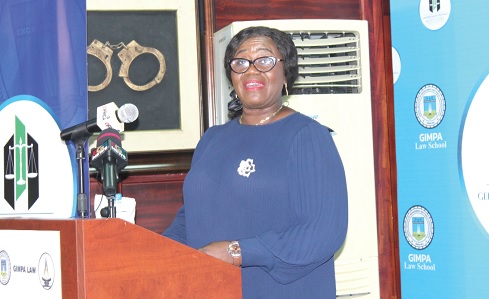
Ethical values key to justice delivery – Chief Justice
The Chief Justice, Justice Gertrude Sackey Torkornoo, has emphasised that it is important for lawyers and judges to make ethical values a cornerstone of their work for effective justice delivery.
She said a holistic approach to ethical values such as the avoidance of conflict of interest, high moral character, integrity, impartial adjudication of cases, and discipline by legal professionals was essential to the effective use of the law to promote stability, security, fairness, innovation and prosperity in society.
Delivering a lecture on the topic “Ethics, Compliance and Accountability: A Holistic Approach to Adjudication’, Justice Torkornoo said ethical values were the means through which other factors of the law were effectively harnessed for justice to be served.
“Ethics is a gentle set of directional signpost that leads the legal professional to the standard of intellectual delivery required for justice to be adequately served to citizens to whom belong the right of justice,” she said.
Advertisement
Lecture
The lecture by the Chief Justice was the highlight of the launch of a moot court competition named after her by the Ghana Institute of Management and Public Administration (GIMPA) Law School in Accra last Thursday.
Known as the Gertrude Sackey Torkornoo Moot Court Competition, the competition will bring together students from various faculties of law across the country to showcase their advocacy skills and their understanding of the law as it applies to real life situations.
Winners will receive various prizes, including a cash prize of GH¢10,000 sponsored by Justice Torkornoo, and law books sponsored by the Director of the Ghana School of Law, Barima Nana Yaw Kodie Oppong.
Present at the launch were various dignitaries from the legal fraternity, including lawyers and judges, such as Justices Yaw Darko Asare and George Koomson, Justices of the Supreme Court and the Judicial Secretary, Justice Cynthia Pamela A. Addo.
Ethics
Justice Torkornoo reminded legal professionals that adherence to ethical values was a mandatory requirement which had received legal backing from the 1992 Constitution and other laws of the country.
“The application of ethical values in the conduct of legal work is, therefore,π a constitutional requirement and does not merely reside in the enclave of morality and philosophy,” she said.
She highlighted some provisions in the Constitution to drum home the point that the legal profession and justice delivery were hinged on solid ethical values which could not be compromised.
Some of the provisions are Article 125 of the Constitution which stipulates the independence of the judiciary in all aspects of its operations, including financial administration and Article 128, which spells out the mode of appointment of Justices of the Supreme Court to include lawyers of “high moral character and proven integrity.”
The Chief Justice further stated that the Constitution in Articles 146 and 147 provided the procedure for the removal of judges who fell short of the required ethical standards.
With regard to lawyers, she said the Legal Profession Act, 1960 (Act 32) and the Legal Profession (Professional Conduct and Etiquette Rules, 2020 (L.I. 2423) had provided various ethical standards required of lawyers, which were enforced by the General Legal Council (GLC).
“Every purveyor of law, therefore, ought to live with keen consciousness of the constitutional and statutory demands to conduct the practice of law and the administration of justice with ethical values of independence of mind, moral integrity of character, competence in practice, and the pristineness of conduct,” she added.
Great initiative
Justice Torkornoo lauded GIMPA Law School for initiating the moot court competition, which she said would help law students understand and appreciate the practical aspect of the law.
“The moot court experience offers the opportunity to engage with the practice of law from every angle of advocacy.
The briefing instructions will present participants with the model of independent thinking and intellectual training,” she added.
The Rector of GIMPA, Professor Samuel K. Bonsu, said the moot court competition was associated with the Chief Justice due to her unwavering quest throughout her legal career to promote excellent legal practice built on competence and ethical values.
For his part, the Dean of the GIMPA Law School, Dr Kwaku Agyeman-Budu, described the Gertrude Sackey Torkornoo Moot Court Competition as a platform where intellect and advocacy in law converged.
“It will help students across the globe embark on a voyage of discovery that will test their knowledge, hone their skills and challenge their convictions,” he said.
Writer’s email: emma.hawkson@graphic.com.gh
